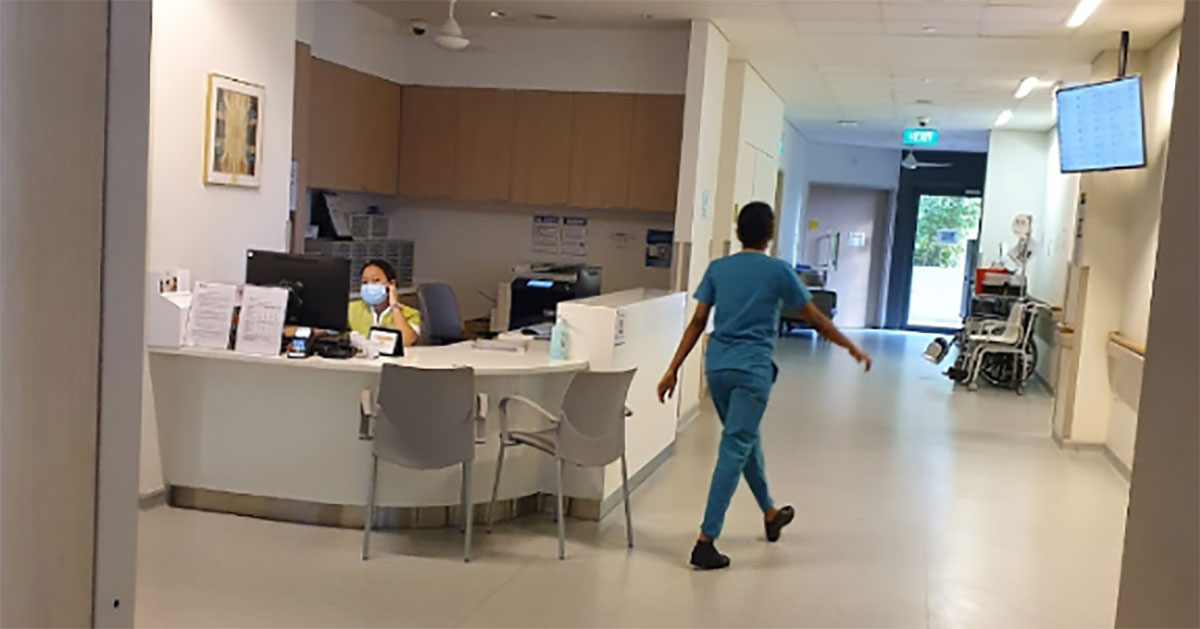Follow us on Telegram for the latest updates: https://t.me/mothershipsg
With more Covid-19 cases in the community and cases detected among hospital staff, patients and visitors, the Ministry of Health (MOH) will be tightening measures at all public, community, and private hospitals to "safeguard hospital capacity".
Visitations to hospital wards to suspend for four weeks
As part of tightened measures, all visitations to hospital wards will be suspended for four weeks, from Sep. 24 to Oct. 23, with both dates included.
However, visitations for certain patient groups will still be allowed on a "case-by-case" basis, subject to the hospitals' assessment, MOH stated in its press release.
The following groups of patients will be allowed one pre-designated visitor for one visitation per day:
- Patients in critical condition
- Paediatric patients
- Birthing/post-partum mothers
- Patients requiring additional care support from caregivers. For instance, the assistance of inpatients who have mental incapacities or family members who are undergoing caregiver training to better care for their loved ones after hospital discharge.
Patients who are in critical condition may be allowed up to five pre-designated visitors, with a maximum of two visitors by the patient's bed at a time.
Requirement for visitors
Regardless of their vaccination status, all approved visitors must produce a "valid negative" rapid antigen test (ART) or polymerase chain reaction test (PCR) result obtained within 24 hours of each visit.
The tests must be administered or supervised by MOH-approved test providers, including Quick Test Centres.
Only persons who have recovered from Covid-19 and can present a valid Pre-Event Test (PET) exemption notices are exempt from the aforementioned requirement.
The approved visitors must also wear masks "with good filtration capabilities" at all times during their visit.
Eating and drinking are prohibited in the inpatient wards, and visitors are not allowed to use the patients' toilets.
Additionally, visitors must also avoid sitting on patients' beds.
ART testing required for emergency patients
To reduce the risk of Covid-19 transmission at Emergency Departments (ED), patients who display acute respiratory infection (ARI) symptoms are now segregated from the other patients.
From Sep. 24, "higher-risk" patients and accompanying persons will be subjected to mandatory ART testing as part of enhanced measures.
The following groups of higher-risk patients will be required to undergo ART testing at EDs and 24-hour emergency clinics regardless of their vaccination status:
- Patients who are lodged in ED beds for prolonged observation in the short stay unit or Extended Diagnostic and Treatment Unit (or in the observation bay/wards in the private hospitals)
- Patients who are required to undergo mask-off assessment and/or procedures lasting for 15 minutes or more
Meanwhile, accompanying persons who are allowed to stay with the patient throughout the observation period or more than 30 minutes will also be required to do the ART test.
According to MOH, the government will subsidise the tests for patients till the end of the year, regardless of their vaccination status. However, accompanying persons may be charged for the tests, depending on the hospitals.
Increased surveillance testing for hospital staff and vendors
MOH added that the detection of Covid-19 cases at hospitals had led to ward closures and staff quarantine.
In response, MOH has stepped up the frequency of surveillance testing for hospital staff and vendors who work in the hospitals in order to identify Covid-19 infections earlier.
MOH has also increased the frequency of surveillance testing for hospital staff and vendors who work in the hospitals, to identify infections earlier.
The ministry said that they will "review and calibrate" the measures on a regular basis in view of developing situation.
MOH urges non-emergency patients to avoid going to hospitals
To preserve hospital capacity, those who have non-emergency conditions or mild symptoms are urged to avoid seeking treatment at hospitals and should consult General Practitioners (GPs) or Urgent Care Centres instead.
People who are concerned that they have been infected by Covid-19 should proceed to a "Swab and Send Home" (SASH) clinic. The SASH GPs will assess the severity of the person's symptoms and perform Covid-19 diagnostic tests when needed to confirm the person's health status.
Follow and listen to our podcast here
Top image via Google Maps
If you like what you read, follow us on Facebook, Instagram, Twitter and Telegram to get the latest updates.
